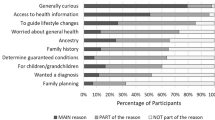Abstract
Population genetic screening for preventable adult-onset hereditary conditions may improve disease management and morbidity but most individuals will receive uninformative results that do not indicate higher risk for disease. Investigation into subsequent psychosocial health and behaviors is necessary to inform population screening feasibility, effectiveness, and cost considerations. We conducted a prospective survey study of unselected University of Washington Medicine patients enrolled in a genetic research study screening for pathogenic variation in medically important genes. Survey questions adapted from the Feelings About genomiC Testing Results (FACToR) questionnaire and designed to understand perceived disease risk change and planned health behaviors were administered after receipt of results. Overall, 2761 people received uninformative results and 1352 (49%) completed survey items. Respondents averaged 41 years old, 62% were female, and 56% were Non-Hispanic Asian. Results from the FACToR instrument showed mean (SD) scores of 0.92 (1.34), 7.63 (3.95), 1.65 (2.23), and 0.77 (1.50) for negative emotions, positive emotions, uncertainty, and privacy concerns, respectively, suggesting minimal psychosocial harms from genetic screening. Overall, 12.2% and 9.6% of survey respondents believed that their risk of cancer or heart disease, respectively, had changed after receiving their uninformative genetic screening results. Further, 8.5% of respondents planned to make healthcare changes and 9.1% other behavior changes. Future work is needed to assess observed behavior changes attributable to uninformative screening results and if small changes in behavior among this population have large downstream impacts.
This is a preview of subscription content, access via your institution
Access options
Subscribe to this journal
Receive 12 print issues and online access
$259.00 per year
only $21.58 per issue
Buy this article
- Purchase on Springer Link
- Instant access to full article PDF
Prices may be subject to local taxes which are calculated during checkout


Similar content being viewed by others
Data availability
Datasets generated and/or analyzed during the current study are not publicly available as they include some data from the University of Washington EHR and consent forms did not include broad data sharing. Deidentified datasets generated and/or analyzed during the current study are available from the corresponding author on reasonable request.
Code availability
Code used to analyze study data is available from the corresponding author on reasonable request.
References
Abul-Husn NS, Manickam K, Jones LK, Wright EA, Hartzel DN, Gonzaga-Jauregui C, et al. Genetic identification of familial hypercholesterolemia within a single U.S. health care system. Science. 2016;354:aaf7000.
Abul-Husn NS, Soper ER, Braganza GT, Rodriguez JE, Zeid N, Cullina S, et al. Implementing genomic screening in diverse populations. Genome Med. 2021;13:17.
Buchanan AH, Kirchner HL, Schwartz MLB, Kelly MA, Schmidlen T, Jones LK, et al. Clinical outcomes of a genomic screening program for actionable genetic conditions. Genet Med. 2020;22:1874–82.
Grzymski JJ, Elhanan G, Morales Rosado JA, Smith E, Schlauch KA, Read R, et al. Population genetic screening efficiently identifies carriers of autosomal dominant diseases. Nat Med. 2020;26:1235–9.
Butterfield RM, Evans JP, Rini C, Kuczynski KJ, Waltz M, Cadigan RJ, et al. Returning negative results to individuals in a genomic screening program: lessons learned. Genet Med. 2019;21:409–16.
Hoell C, Aufox S, Nashawaty N, Myers MF, Smith ME. Comprehension and personal value of negative non‐diagnostic genetic panel testing. J Genet Couns. 2021;30:418–27.
Rao ND, Kaganovsky J, Malouf EA, Coe S, Huey J, Tsinajinne D, et al. Diagnostic yield of genetic screening in a diverse, community-ascertained cohort. Genome Med. 2023;15:26.
Li M, Bennette CS, Amendola LM, Ragan Hart M, Heagerty P, Comstock B, et al. The Feelings About genomiC Testing Results (FACToR) questionnaire: development and preliminary validation. J Genet Couns. 2019;28:477–90.
Elo S, Kyngäs H. The qualitative content analysis process. J Adv Nurs. 2008;62:107–15.
Braun V, Clarke V. Using thematic analysis in psychology. Qual Res Psychol. 2006;3:77–101.
Biesecker BB, Chan P, Han PK, Klein WM, Biesecker LB, Lewis K. Perceived utility and intentions to change health behaviors and screening among African descendants following receipt of negative secondary findings from genome sequencing [abstract]. Ann Behav Med. 2020;S421. https://doi.org/10.1093/abm/kaaa009.
Acknowledgements
This work was funded by a gift from the Brotman Baty Institute for Precision Medicine.
Funding
This study was funded by the Brotman Baty Institute for Precision Medicine.
Author information
Authors and Affiliations
Contributions
Conceptualization: BHS, DLV, NDR; Data curation: BHS, JK, NDR; Formal analysis: BHS, KK, NDR; Funding acquisition: BHS; Investigation: DT, JK, SH; Methodology: ATC, BHS, NDR; Resources: JK; Software: NDR; Visualization: NDR; Writing-original draft: BHS, NDR; Writing-review & editing: All authors.
Corresponding author
Ethics declarations
Competing interests
The authors declare no competing interests.
Ethics approval
The study was approved by the University of Washington IRB (00009032) and was performed in accordance with the ethical standards as laid down in the 1964 Declaration of Helsinki and its later amendments or comparable ethical standards. Written informed consent was obtained from all individual participants included in the study.
Additional information
Publisher’s note Springer Nature remains neutral with regard to jurisdictional claims in published maps and institutional affiliations.
Supplementary information
Rights and permissions
Springer Nature or its licensor (e.g. a society or other partner) holds exclusive rights to this article under a publishing agreement with the author(s) or other rightsholder(s); author self-archiving of the accepted manuscript version of this article is solely governed by the terms of such publishing agreement and applicable law.
About this article
Cite this article
Rao, N.D., King, K.M., Kaganovsky, J. et al. Risk perception and intended behavior change after uninformative genetic results for adult-onset hereditary conditions in unselected patients. Eur J Hum Genet 32, 77–82 (2024). https://doi.org/10.1038/s41431-023-01460-3
Received:
Revised:
Accepted:
Published:
Issue Date:
DOI: https://doi.org/10.1038/s41431-023-01460-3
This article is cited by
-
Managing genetic information sharing at family and population level
European Journal of Human Genetics (2024)


